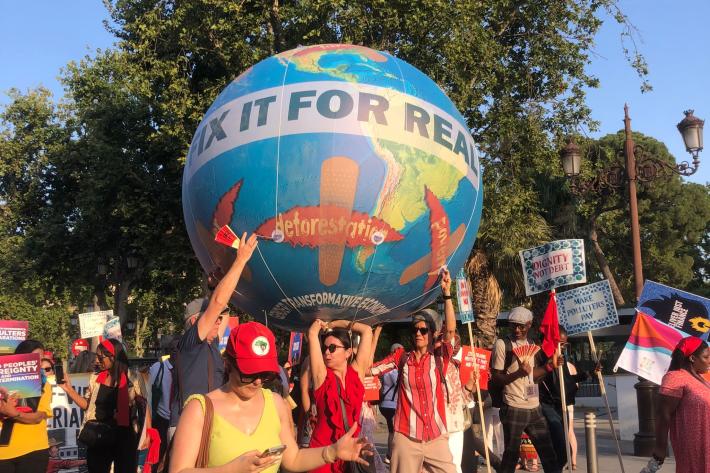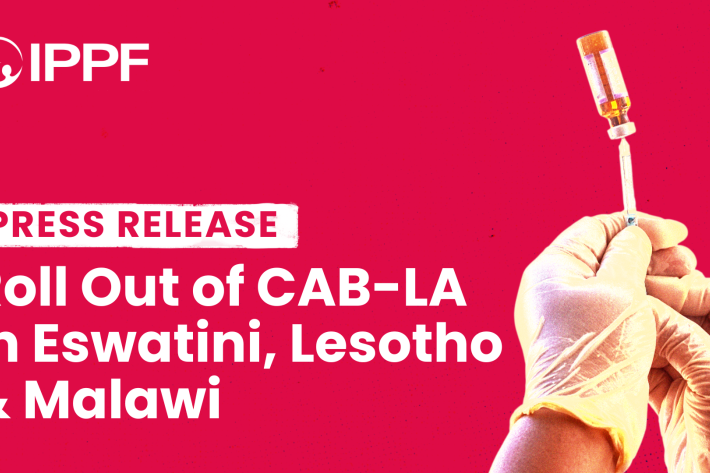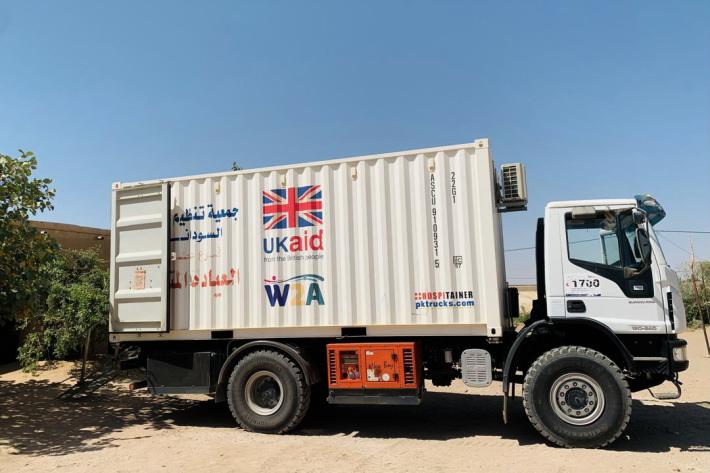Latest press releases
A selection of stories from across the Federation

Zambia, Tanzania, Kenya, Congo, Dem. Rep., Mali
Over 1.4 Million Women and Girls in Africa Left Without Contraception as U.S. Orders Destruction of Global Supply
For immediate release
For media enquiries
Telephone:
+44 7918 845944Email IPPF:
Email: media@ippf.org

| 19 June 2024
IPPF Statement on the Ongoing Violence in Haiti
Haz click aquí para leer este posicionamiento en español The International Planned Parenthood Federation (IPPF) is deeply concerned about the escalating violence and political instability in Haiti, particularly its disproportionate impact on women and girls since March 2024. This crisis is expected to leave 3,000 pregnant women without essential medical care, leading to nearly 450 women experiencing life-threatening childbirth complications. With almost 580,000 Haitians displaced, women and girls are experiencing an alarming surge in sexual and gender-based violence (SGBV), including rampant sexual assaults, torture, and collective rape by armed groups. From January to March 2024, there were 1,793 SGBV incidents reported. Conflict-related insecurity has also significantly increased negative coping mechanisms, contributing to the rise in SGBV, as well as sexually transmitted infections and HIV. The ongoing violence is preventing access to essential sexual and reproductive healthcare services, endangering the lives of mothers and newborns. Our partner in Haiti, the Haiti Midwives Association, informed us, ‘the gangs prohibit the movement of motorcycles and pedestrians, threatening and sometimes shooting in the air to terrorise us further. Due to these difficult conditions, fewer and fewer patients are attending the hospital, whether for prenatal consultations, deliveries or postnatal care.” This inaccessibility has led to a significant increase in maternal and infant mortality. Eugenia López Uribe, Regional Director of the IPPF Americas & the Caribbean, said, “Humanitarian aid must be granted access through local organisations, such as our partner the Haiti Midwives Association, and their wellbeing must be guaranteed in this process. Women and girls can no longer wait! Our partner has provided access to vital emergency services such as pregnancy, childbirth and postpartum care, as well as care after sexual violence for 20 years. However, since February, they have been forced to stop their activities because of the imminent risks they face as women living in Port-au-Prince and surrounding areas.” On this International Day for the Elimination of Sexual Violence in Conflict, IPPF calls for zero tolerance toward any form of SGBV and demands the immediate protection of Haitian women, children, and those most at risk. We strongly call for unhindered humanitarian access to allow aid into Haiti. This aid must be designed and controlled by local NGOs and aid workers, and any foreign peacekeepers must safeguard and protect local communities - in particular their sexual and reproductive rights - so mistakes of the past are not repeated. Let’s not forget: Haiti's poverty and instability has been shaped by decades of foreign occupation and colonialism. The international community owes Haiti more than mere condolences; they owe an unwavering commitment to a future where human rights, including sexual and reproductive health rights are respected and protected, and nobody is left behind.

| 21 February 2023
Colombia decriminalizes abortion: one year anniversary
Profamilia – an IPPF Member Association and the leading sexual and reproductive rights organization in Colombia – is celebrating the first anniversary of the decriminalization of abortion across the country. The move - Ruling C-055 - which allows abortion up to 24 weeks of gestation under any circumstance is saving lives across Colombia, and means those who have an abortion no longer face prosecution or criminalization. A historic step for the rights of women and pregnant people both in the country and across Latin America. Over the last year, Profamilia via its nationwide network of more than 50 clinics has helped guarantee sexual and reproductive health and rights, focusing on providing safe abortion care services in person as well as the provision of telemedicine for rural women. For a country which sees 132,000 cases annually of complications from unsafe abortions and 70 women lose their lives each year – the shift in focus to abortion as a public health issue means healthcare providers can now focus on providing life-saving care and ending unsafe abortion. Alongside the ruling, the Ministry of Health, has also regulated abortion services throughout Colombia via Resolution 051, reiterating that abortion is an essential and urgent health service, which women, including migrant women, and pregnant people (transgender men, trans masculinities, non-binary people, among others) must be able to access without restriction and for free. Further rulings also embeds the provision of sexual and reproductive health information into Colombian health services. Marta Royo, the Executive Director of ProFamilia, said: "Profamilia's commitment will always be to provide comprehensive, humanized and safe services that allow free and informed decision making, and we reiterate this today” "After one year it is possible to see the progress the country has made in terms of reproductive autonomy and rights for women and pregnant people. However, we must move from text to action, and ensure that decriminalization means healthcare. Profamilia's commitment will always be to provide comprehensive, humanized and safe services that allow free and informed decision making." Eugenia López Uribe, Regional Director of IPPF for the Americas and The Caribbean.

| 09 March 2022
Statement on the Guatemalan law on 'Protection of the Life and the Family'
On International Women's Day 2022, Guatemala's Congress passed a law which triples the prison sentences for women seeking abortion care, prohibits same-sex marriage and further bans the teaching of comprehensive sexuality education and sexual diversity in schools, saying that teaching "anything other than heterosexuality is normal" is against the law. The "Life and Family Protection Law" was passed by an overwhelming majority of 160 - 8 in the conservative-led Congress, but still needs to be signed by Guatemala's president, Alejandro Giammattei, in order to come into force. Under the new law, women who "have induced their own abortion or given their consent to another person to carry it out" will face a minimum of five years in jail, but the sentences could reach a maximum of 25 years. Abortion is illegal in Guatemala except in cases where the woman's life is at risk. This law is the latest of a series of laws to attack human rights across the country, including gender equality and sexual and reproductive health and rights. The initiative goes against human rights agreements, especially for women and LGBTI+ people and condemns and denies the diversity of families including mono-parental homes. Eugenia Lopez Uribe, IPPF's Regional Director for Americas and the Caribbean Region, said: "It is disturbing that on International Women's Day 2022, the Guatemalan Congress passed a law that completely violates the human, sexual and reproductive rights of women, girls and marginalized people. "While countries across Latin America were celebrating the lives and rights of women, Guatemala has chosen to criminalize those making the best decision for themselves and their families, while also risking imprisoning vulnerable women and girls who have experienced sexual violence or suffered pregnancy loss. By severely limiting access to safe and post-abortion care, the law will undoubtedly lead to an increase in unsafe abortions and a decrease in prenatal care, resulting in life-long disabilities for some women and a rise in maternal deaths. "At the same time, by prohibiting same-sex marriage, limiting comprehensive sexuality education and enabling the discrimination of sexual diversity, the Guatemalan government is creating a society that fosters miseducation, stigma, intolerance and homophobia and fuelling the persecution of LGBTI and non-binary people. "IPPF strongly condemns the passing of this archaic law and demands that the Guatemalan government fulfils international human rights agreements. We stand in solidarity with affected people across Guatemala and the organizations working tirelessly to ensure that all people have the freedom to make their own choices." For media enquiries, please contact Karmen Ivey on kivey@ippf.org or media@ippf.org

| 22 February 2022
Colombia decriminalizes abortion
Today, the Colombian Constitutional Court decriminalized abortion up to 24 weeks in another victory for the Green Wave sweeping through Latin America. The historic decision follows years of campaigning by women's right's activists across Colombia and came off the back of two lawsuits that asked the court to declare article 122 of the penal code, that "the woman who causes her abortion or allows another to cause it, will incur a prison sentence from sixteen (16) to fifty-four (54) months" as unconstitutional. The court called an extraordinary meeting today, Monday 21st February, and took just a few hours to come to its decision which will go into effect immediately. ProFamilia, the International Planned Federation's Member Association in Colombia, and Colombia's largest provider of legal abortion care were heavily involved in pushing to extend the rights of those needing to access abortion care. Marta Royo, Executive Director for Profamilia, IPPF's Member Association in Colombia, said: "Today is a ground-breaking moment for the people of Colombia and a long-overdue guarantee of reproductive rights and dignity for all those who need abortion care, especially poor and rural women who bear the brunt of restrictive abortion policies. "The decriminalization of abortion up to 24 weeks in Colombia and the Green Wave movement across Latin America is centred not just on public health, but also the full lives, citizenship and human rights of girls, adolescents, and women – who, for multiple reasons, including inequity, access to education, gender-based violence and barriers to healthcare – continue to face unintended pregnancies. "The freedom for women to finally make their own choices about their pregnancies and their bodies is fundamental to disrupting the cycle of poverty that so many in Colombia face. This monumental decision is also a win for the dedicated health care providers, who will finally be recognized as people who simply care about the needs of others." While Colombian women have supposedly been able to access abortion care since 2006 under three circumstances: if their life or health is at risk, in cases of fatal foetal abnormalities, or if the pregnancy is the by-product of rape or incest, in reality, the criminalization of abortion persisted. The Guttmacher Institute found that less than one per cent of the estimated 400,000 abortions carried out each year in Colombia are performed legally, with women, especially poor, rural, vulnerable and marginalized women, facing significant barriers to accessing safe and timely abortion care. Many Colombian women are instead forced to carry their pregnancies to term or else seek other methods to end them. Figures collected by ProFamilia showed that during 2020, there were at least 26,223 unsafe abortions across Colombia, a startling amount for which consequences range from infection to life-changing injuries to death. As per the previous abortion law, other women have been imprisoned for up to four and a half years for having an abortion, even in cases where abortion should have been legal. In a shocking example of discrimination, data collected showed that poor rural women were more likely to be charged, with a third of those who faced charges also survivors of sexual violence. Eugenia Lopez Uribe, IPPF's Regional Director for Americas and the Caribbean Region, said: "Today Colombia took another step in the right direction for gender equality and full human rights for all, and we are incredibly proud of IPPF's Member Association, ProFamilia, for their tireless work alongside thousands of activists across Colombia and Latin America "This 24-week decriminalization is historic in the region and especially remarkable when we consider the current fragility of abortion rights globally and the anti-choice movements which continue to plague nations across the world, including in countries close to home like the United States of America. "While today we are celebrating this historic decision, the Green Wave is strong and growing, and the fight for reproductive rights and justice will not end until every person can access high-quality sexual and reproductive healthcare when and where they need it." For media enquiries in English, please contact Karmen Ivey on kivey@ippf.org or media@ippf.org For media enquiries in Spanish or during UK night-time hours, please contact Pamela Martin Garcia on PMartinGarcia@ippf.org
















